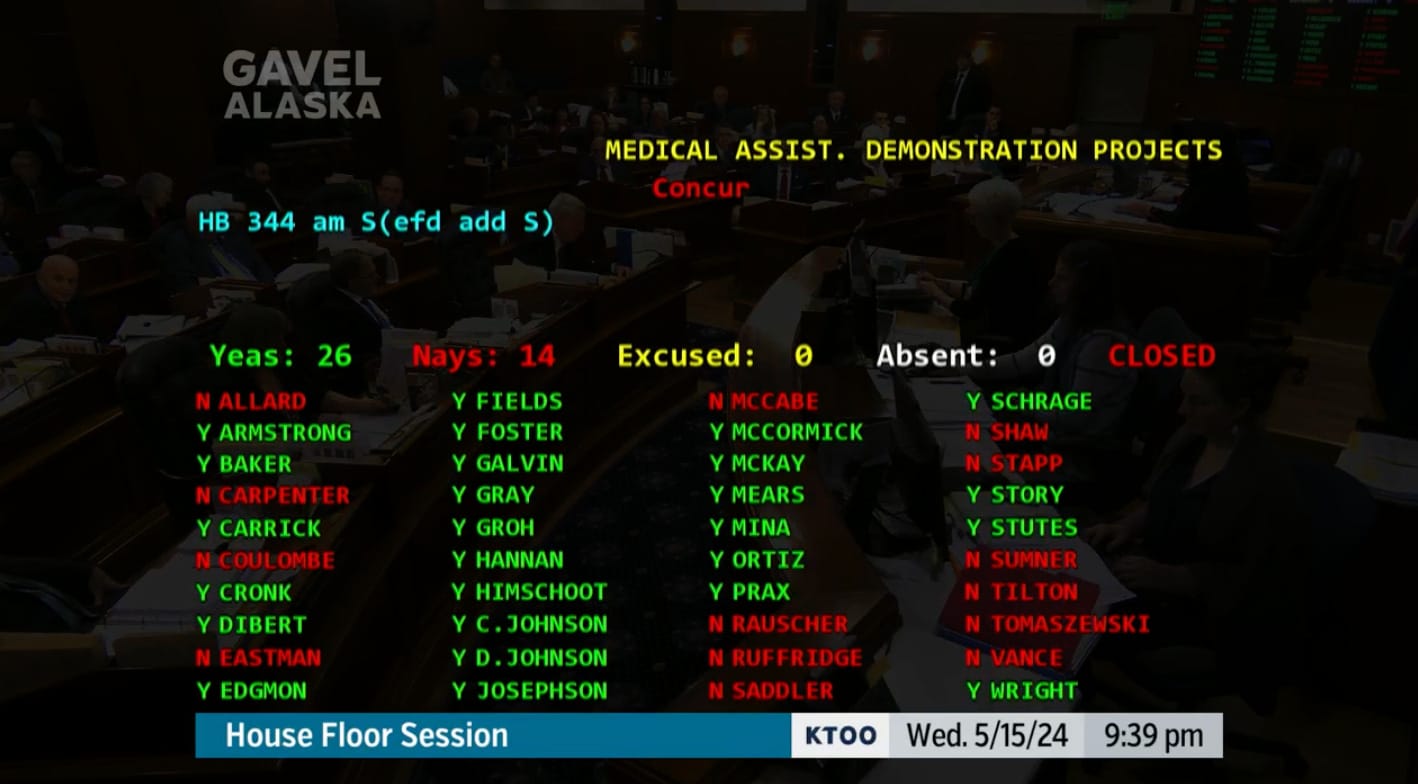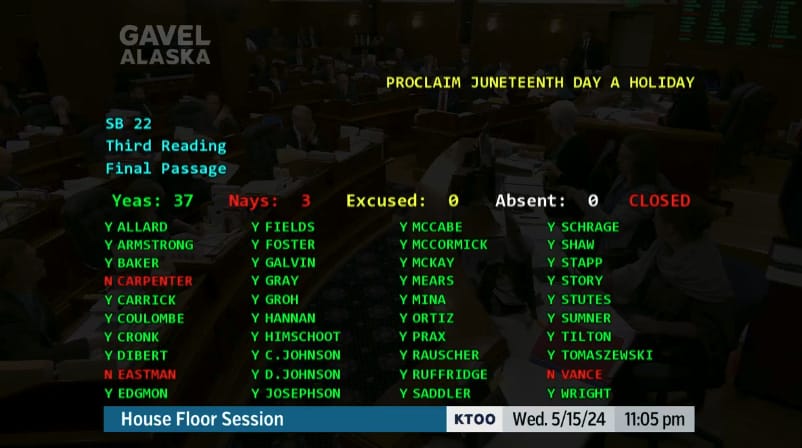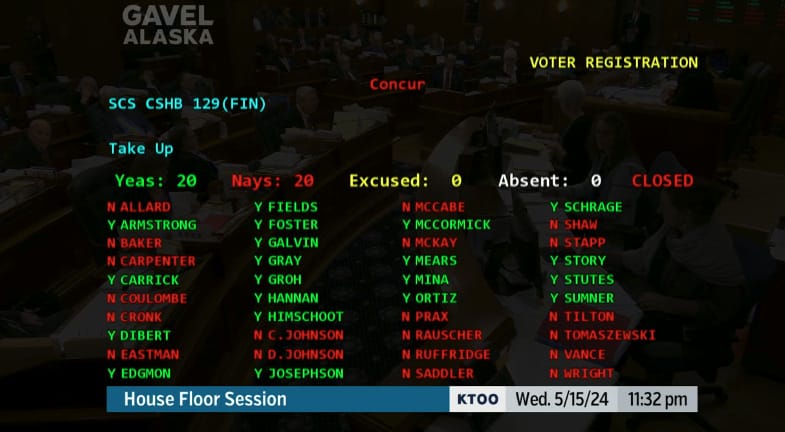AKLEG: Sine Die
In this edition, I’ll be breaking down four things that caught my attention… then taking another nap.

Happy Friday, Alaska.
In this edition: The 33rd Alaska Legislature ended in the early morning hours on Thursday, capping off a chaotic few days that will take several more to fully unpack. Some bills passed, many died, and several others were quietly crammed into other bills. Once I catch up on my sleep deficit, I’ll have more analysis breaking down issues like energy, education and the criminal justice system. In this edition, I’ll be breaking down four things that caught my attention… then taking another nap. Thanks to everyone who has followed along this year.
Current mood: 😪
Expanded food stamp coverage passes

Many factors have contributed to the state’s chronic backlog in processing food stamp applications, which have left in-need Alaskans waiting months or more for assistance, but the applications themselves are high on that list. While some band-aids like beefed-up staffing and supplemental grants to food banks have been applied, the application is a substantial burden on both the applicants and the state. Rep. Genevieve Mina (D-Anchorage) and Sen. Cathy Giessel (R-Anchorage) have worked on a fix that would enact what’s called broad-based categorical eligibility for the program and saw their efforts successful when the measure passed as an amendment to a bill by the governor dealing with Medicaid.
“SNAP is Alaska’s strongest anti-hunger program, and people were going hungry, where they had to resort to eating dog food, and kids were taking turns eating food every day,” she said on the floor Wednesday night. “Food pantries are pleading for help. … This will help feed thousands of Alaskans at great savings to the state. It helps promote self-sufficiency for Alaskans and government sufficiency for our state.”
The changes would increase the income eligibility cutoff from 30% above the poverty level to twice the poverty level. Importantly, it would also remove the asset test that barred recipients from having more than $4,000 in belongings, which advocates say discourages people from saving and complicates the review process. In essence, they argued the system kept people poor while racking up significant costs for the state.
During the session, legislators heard anecdotes about families narrowly losing food stamp benefits after a parent got a minor raise or the family was gifted a car. In those cases, advocates said that the loss of food stamp benefits often outweighed the raise or the value of the vehicle. In some cases, kids went hungry, and in others, families declined the raises or gave back cars. In all, it was heartbreaking.

The amended measure cleared the Senate 20-0, and the House concurred on a 26-14 vote, where several right-wing Republicans opposed the measure with warnings that it’d make it too easy for people to access social safety net programs. The proposal, attached to a governor’s bill dealing with Medicaid, heads next to the governor.
Juneteenth passes

The turning point for Anchorage Democratic Sen. Elvi Gray-Jackson’s bill establishing Juneteenth as an official state holiday in Alaska—commemorating June 19 as the day slavery ended—came in the House Finance Committee in early February. Republicans were bristling at the price tag on the legislation, which comes from it being a state holiday and floating alternatives that would have undermined the bill, such as making it a holiday in name only or eliminating another holiday.
But Sen. Gray-Jackson didn’t stand down.
“You cannot put a price on celebrating freedom,” she said during a back and forth with Rep. DeLena Johnson, R-Palmer, over the estimated holiday cost, which is a little less than $1 million to cover the overtime in eight departments.
When the legislation finally made it to the floor late on Wednesday, Sen. Gray-Jackson’s words were echoed by Fairbanks Republican Rep. Will Stapp, a combat veteran, who agreed that you can’t put a price on celebrating freedom.
The bill cleared the House on, as legislative data whiz Will Muldoon described, “a 37-of course it’s them” vote. The three votes against were none other than extreme-right Republican Reps. David Eastman, Ben Carpenter and Sarah Vance.
The Alaska Memo by Matt Buxton is a reader-supported publication. To receive new posts and support my work, consider becoming a free or paid subscriber.
Home school fix, including much-needed guardrails, passes

The Republican-led House never produced the make-up education bill they claimed was totally doable after they upheld Gov. Mike Dunleavy’s veto of the hard-fought bipartisan compromise, but legislators managed to come together to slip a fix for the homeschool ruling in under the deadline.
With disagreements over the level of oversight for the program and the governor’s insistence that they fight out the issue in the courts — holding the specter of a special session over legislators’ heads — lawmakers reached an eleventh-hour compromise. In an amendment to a bill dealing with opioid overdose prevention in schools, legislators approved a change that would implement the relatively straightforward proposal that the Republican House has preferred. It essentially tells the state Board of Education to develop the necessary regulations while following the Alaska Constitution’s prohibition on public spending on private and religious schools.
However, it does also include the greater oversight on home school programs that the Senate has favored in the form of regular reports on spending, demographics, academic performance and curricula. The lack of meaningful information on correspondence programs is a product of the 2014 laws—authored by then-Sen. Mike Dunleavy—that a judge found unconstitutional.
The Alaska Supreme Court has agreed to fast-track the appeal of the Superior Court ruling, with arguments expected later this summer.
Election bill that sought to address the high rate of rejected rural ballots dies

The last and final fight of the legislative session played out on the House floor in the early hours of Thursday morning. Having crossed the midnight threshold, the House voted on a handful of concurrence votes and then went to adjourn for the year. That vote failed, and what played out over roughly the next hour was a bitter fight over an election bill that would have addressed issues that have, in recent years, contributed to an extremely high rate of rejected absentee ballots in rural communities.
House Republicans, primarily extreme-right Home Rep. Sarah Vance, angrily complained that the Senate had softened the underlying bill, which seeks to kick people off the voter rolls faster in the name of voter trust, too much. Republicans then spent much of the time with procedural maneuvering to block the chamber from taking up the bill, which sounds like it likely had the votes to pass, with arguments that anything done after midnight was legally questionable. It’s a silly argument, given that they had already passed five bills after midnight, and the language in the constitution they were pointing to doesn’t distinguish between an hour and a minute over the clock. That said, there’s also legal precedent that the legislative day doesn’t run out with the time but with their agenda of bills.
Still, Republicans successfully adjourned without taking it up, killing the bill.
The provisions to repeal the witness signature requirement and create a ballot curing process were a big deal, particularly to most rural legislators. On the Senate floor, Sens. Lyman Hoffman (D-Bethel) and Donny Olson (D-Golovin) were particularly fiery over the measure. They noted that the requirements had led to the rejection of a massive amount of absentee ballots in their districts, a long-running issue that was felt particularly acutely in the by-mail election held in 2020 when thousands of ballots were rejected without any recourse (I’ve written about the issue here).
“Imagine how you would feel if that happened in your district!” said Sen. Hoffman, noting as much as 15% of the ballots cast in his district were rejected.
The witness signature is ostensibly there to catch fraud, but it has never done that—largely because there’s no verification system in place. Instead, it was a particularly troublesome barrier for some to vote during the pandemic.
“I understand that people don’t understand what rural Alaska is all about. Some people have been out there, say they’ve even lived there for a while, but when it comes time to voting, that’s sacred,” Sen. Olson said, a dig at Palmer Republican Sen. Shelley Hughes, who frequently talks about a short time she lived in rural Alaska whenever rural issues come up. “If that many people are disenfranchised from voting, it’s up to us to go ahead and figure out a change. … When you want every vote to be counted, that includes little old lady out in Savoonga or Shaktoolik who have got to struggle to get to the post office or the poll on a stormy day and then realize they might not be counted? That is something that should not happen.”
However, not all rural legislators seemed as motivated by the issue. Republican Rep. Thomas Baker, a Kotzebue Republican who has frequently found himself at odds with his district, was the lone rural member to vote against taking the bill up. It was a 20-20 vote, too, which makes Baker the critical vote in killing the bill.
In the big picture, the whole Republican backlash and accompanying histrionics — with Rep. Kevin McCabe crying that it was the worst thing that has ever happened in the Legislature and several Republicans who simply refused to vote, essentially blocking key votes — was particularly interesting, given that the legislation would still have to clear Gov. Mike Dunleavy. As several Republicans said they did with the education bill, they could get it over to him with the plan of having him veto it.
Follow the thread: The final live-tweet session of the session.
Weekend watching
Things got pretty loopy. Even though Rep. Vance ultimately succeeded in blocking election reforms from passing, it did produce this moment:
Have a nice weekend, y’all.
The Alaska Memo by Matt Buxton is a reader-supported publication. To receive new posts and support my work, consider becoming a free or paid subscriber.
The Alaska Memo Newsletter
Join the newsletter to receive the latest updates in your inbox.




